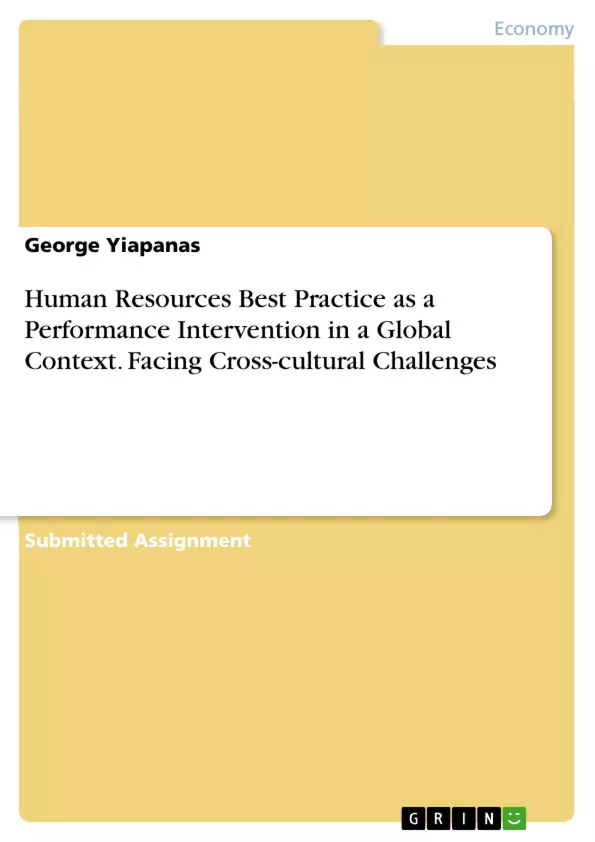In a global economic environment where competition changes rapidly, HR decisions have a crucial role to play in influencing the MNC’s performance, by improving efficiency and contributing to revenue growth. Personnel Management (PM) has always been considered a vital function, a function that was mainly dealing with routine administrative activities such as hiring employees and maintaining records. The extensive competition, mainly due to technology change, deregulation and globalisation, increased the PM’s operations and upgraded the concept and perspective over it.
By moving on and replacing PM with Human Resource Management (HRM), organisations started recognising people as an important asset and as a business partner. This changed the role of the HR department, engaging more activities and practices such as communication, recruiting, training, development, motivation, etc. making HRM a more dynamic operation, designed to maximise personnel’s performance. According to Mello (2014), Strategic Human Resource Management (SHRM) refers to the strategic concept of HR that gives the opportunity to HR professionals to play a more substantial role in the success of the organisation by developing systems and policies aligned with the MNC’s targets and goals. Obviously, SHRM does not replace HRM, but it empowers its role.
Inhaltsverzeichnis (Table of Contents)
- Introduction
- Recruitment and selection
- Training and development
Zielsetzung und Themenschwerpunkte (Objectives and Key Themes)
This report critically analyses the use of recruitment, selection, training and development as intervention tools to justify HR challenges in MNCs. It focuses on the importance of HR decisions in influencing MNC performance in a globalized economic environment.
- The influence of HR practices on MNC performance in a globalized environment
- The challenges of applying HR "best practices" in a cross-cultural context
- The role of recruitment and selection in addressing cultural diversity and performance goals
- The importance of training and development in minimizing the drawbacks of cultural diversity and gaining competitive advantage
Zusammenfassung der Kapitel (Chapter Summaries)
- Introduction: The introduction establishes the critical role of HR in influencing MNC performance. It discusses the evolution of HR from Personnel Management to Strategic Human Resource Management (SHRM), highlighting the importance of people as an asset and the need to align HR practices with organizational goals. The section also touches on the "Hard" and "Soft" approaches to employee management and the debate between the "Best Practice" and "Best Fit" models for HR practices.
- Recruitment and Selection: This chapter focuses on the importance of recruitment and selection processes in achieving MNC performance goals. It discusses the key aspects of a successful recruitment process, including job description analysis, recruitment channels, and the selection process itself. The chapter also examines the challenges of recruiting in a cross-cultural context, including the importance of considering cultural differences, cultural sensitivity, and cross-cultural skills in candidate selection.
Schlüsselwörter (Keywords)
This report focuses on the intersection of HR practices, cross-cultural challenges, and MNC performance in a globalized economic context. Key terms include: Strategic Human Resource Management (SHRM), "Best Practice" vs. "Best Fit" models, cross-cultural competency, recruitment and selection processes, training and development, cultural diversity, and MNC performance.
Frequently Asked Questions
What is Strategic Human Resource Management (SHRM)?
SHRM is a strategic approach that aligns HR systems and policies with the long-term targets and goals of a multinational corporation (MNC).
What are the challenges of HR in a global context?
Key challenges include cross-cultural differences, cultural sensitivity, and managing diversity across different international locations.
What is the "Best Practice" vs. "Best Fit" debate?
The debate centers on whether there is one single set of HR practices that works for all firms (Best Practice) or if HR must be tailored to the specific context of the firm (Best Fit).
Why are recruitment and selection critical for MNCs?
They ensure that candidates possess not only the necessary technical skills but also the cross-cultural competency required to work in a globalized environment.
How does training and development contribute to competitive advantage?
By minimizing the drawbacks of cultural misunderstandings and enhancing the skills of the global workforce, MNCs can improve efficiency and performance.
- Arbeit zitieren
- George Yiapanas (Autor:in), 2015, Human Resources Best Practice as a Performance Intervention in a Global Context. Facing Cross-cultural Challenges, München, GRIN Verlag, https://www.grin.com/document/506282



